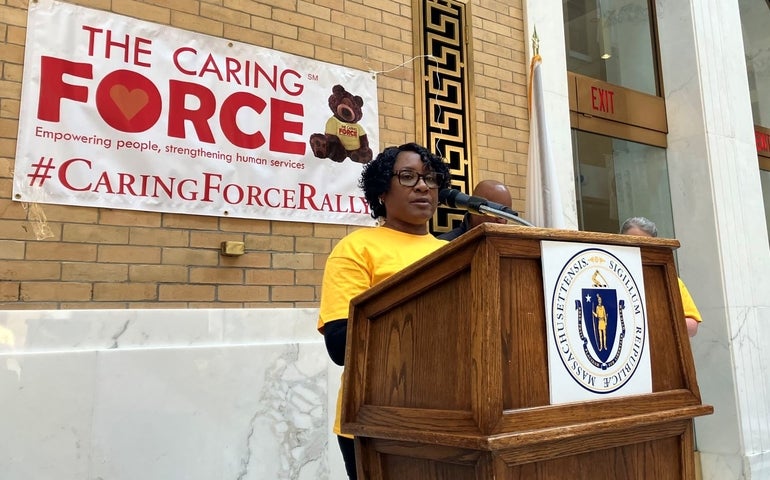Olivia Moultrie, a 28-year-old direct care professional in western Massachusetts, cannot afford the type of services she provides to clients — or weekly therapy visits, chiropractor appointments, or car repairs should her check-engine light come on.
She’s worked at ServiceNet, a nonprofit mental health and human service agency, for seven years. Moultrie’s low wages have kept her living at home with family, as she avoids facing the prospect of burnout from paying for an apartment.
“I like my job because I provide a service to people that are in need, and it takes a special type of person to do this job,” Moultrie said during a State House rally Tuesday, with hundreds of caregivers, clients and activists in attendance. ” And this job is not for the weak. At a job that requires you to be a caregiver, a friend, a counselor, a CNA, a chef, a driver, an advocate and plenty more, you would think I make a livable wage.”
According to the MIT Living Wage Calculator, Moultrie should be earning an hourly pay of $21.35, a boost of $2.35 that would translate into more than $4,500 annually, she said.
Members of The Caring Force — the advocacy arm of the Providers’ Council, which represents community-based organizations in the human services sector — touted legislative proposals at their 11th annual rally that would bolster wages and create a loan repayment program.
Circumstances in the human services sector are “dire,” as caregivers contend with financial pressures, time burdens, staffing shortages and burnout, said Lydia Todd, committee chair of The Caring Force.
“We can choose a lifetime of working two jobs, and many of us do just that. Others must leave for jobs that pay more, even though they love their work,” Todd said. “Many take positions in state government with better compensation, the promise of a financially secure retirement, reduced need to work overtime or be on call, and weekends off to be with family and friends.”
Bills from Rep. Kay Khan and Cindy Friedman (H 191/ S 84) aim to gradually eliminate pay disparities between state workers and community-based caregivers delivering similar services, disparities that can approach 30 percent, according to the council. The Caring Force also endorsed bills from Reps. Jeffrey Roy and Smitty Pignatelli and Sen. Sal DiDomenico (H 214/ S 77) that could help eligible human services workers be repaid up to $6,000 in loans from their associate degrees, up to $20,000 from bachelor’s degrees, and up to $30,000 from master’s degrees.
Those proposals are awaiting a hearing in the Joint Committee on Children, Families and Persons with Disabilities.
Direct care staff should be earning between $18 and $24 an hour, but most professionals must work two or more jobs due to the low pay, said Alaisha Giles, a residential counselor at ServiceNet. Meanwhile, food service workers make between $18 and $19.50 an hour, she said.
“Why are we, the people that are providing 24-hour care to everyone’s loved ones, getting paid less than the people scanning food or scanning our clothes at T.J. Maxx or HomeGoods?” Giles said.
Tonya Morris, a training specialist and senior survivor mentor at a Boston-based nonprofit that supports people who have been sexually exploited, is committed to her job and intends to “fight” for the rest of her life. While Morris aspires to earn a master’s degree to better help her clients, she struggles to make ends meet and cannot afford the tuition.
“The repayment bill will give me and other human service workers the chance to pursue higher education and help with the financial strain,” Morris said. “There is so much more work I want to do, but without the funding, I am unable to do so. This field deserves so much more than it is given, and the people in this field deserve recognition.”
Senate President Karen Spilka at the rally touted investments to the human services sector last session. The Ashland Democrat also sought to generate support for her chamber’s fiscal 2024 budget proposal that will be debated next week, including nearly $600 million for nursing facility Medicaid rates and free community college initiatives, including a pilot geared toward nursing students.
The Senate is striving to make it easier for health care professionals to “live, study, raise a family, and work here in Massachusetts,” Spilka said.
“We know that our workforce — you — need and deserve to feel supported,” Spilka said. “So please know that we in Massachusetts, in the state and the Senate, will continue to value and support you.”

